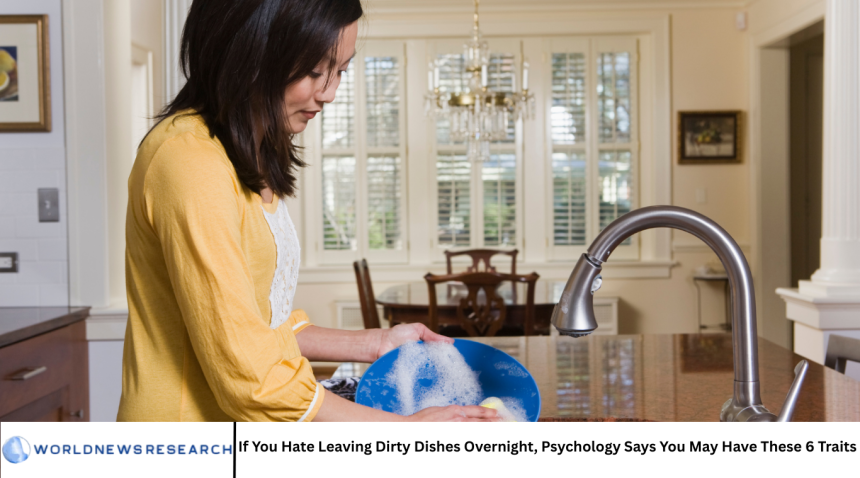It’s a common experience: after a long day, you glance at the sink and notice a pile of dirty dishes. For some, this is no big deal—those plates and glasses can wait until tomorrow. But for others, the very sight of unwashed dishes left overnight causes anxiety, discomfort, or even frustration. If you find yourself compelled to wash those dishes immediately or as soon as possible, you might wonder why. Is it just a personal quirk or preference? Psychology offers fascinating insights into what your attitude toward dirty dishes might reveal about your personality and mental makeup.
In this article, we will explore six psychological traits commonly associated with people who can’t stand leaving dirty dishes overnight. These traits influence how individuals approach cleanliness, organization, and daily routines. Understanding them can shed light on your behavior and even help you embrace your strengths or manage related stress.
High Conscientiousness
One of the strongest psychological traits linked to disliking dirty dishes left overnight is high conscientiousness. Conscientiousness is one of the “Big Five” personality traits, representing how organized, responsible, and detail-oriented a person tends to be.
- People high in conscientiousness typically prefer order and structure. They tend to have disciplined routines and feel uneasy when things appear chaotic or unfinished.
- Leaving dirty dishes overnight may feel like a disruption to their internal order, prompting an urge to complete the task immediately.
- This trait often leads to punctuality, reliability, and good self-control—all factors that motivate timely dishwashing.
Why it matters: High conscientiousness is often associated with success in work and personal life because it drives people to manage their environment effectively.
Perfectionism
Perfectionism is a related but distinct trait that also plays a role. While conscientiousness is about order and responsibility, perfectionism is characterized by setting extremely high standards for oneself and others.
- Perfectionists might find dirty dishes left overnight intolerable because it represents “incompleteness” or “messiness” that conflicts with their ideals.
- This can be linked to a desire for control, a discomfort with imperfection, and a need for things to be “just right.”
- For some, leaving dishes unwashed may cause stress or guilt, motivating immediate cleanup.
Why it matters: Perfectionism can be both a strength and a challenge. It drives attention to detail and quality but may also increase anxiety or procrastination in some cases.
Strong Self-Discipline
Self-discipline refers to a person’s ability to control impulses and stay committed to tasks—even when they’re not enjoyable.
- Those who dislike dirty dishes overnight often demonstrate strong self-discipline by making it a priority to tackle chores promptly.
- This trait helps individuals avoid procrastination and maintain routines, contributing to overall well-being and productivity.
- Washing dishes right away can be seen as a small but important act of self-control, reinforcing a sense of accomplishment.
Why it matters: Self-discipline is key to achieving goals and maintaining healthy habits, including cleanliness and organization.
Need for Control
A psychological need for control is another factor. Some individuals have a heightened desire to manage their immediate environment, reducing uncertainty and disorder.
- Dirty dishes left unattended can feel like a loss of control—something “out of place” or “unresolved.”
- For these individuals, washing dishes immediately restores order and provides psychological relief.
- This need for control may also be connected to managing stress or anxiety.
Why it matters: While a healthy desire for control promotes order, excessive need can lead to rigidity or stress when situations are unpredictable.
High Sensory Sensitivity
Some people experience heightened sensitivity to sensory stimuli—such as sights, smells, or tactile sensations.
- Dirty dishes, especially when left overnight, can produce unpleasant visual clutter or odors that affect those with high sensory sensitivity more intensely.
- This discomfort can motivate immediate cleaning to eliminate sensory triggers.
- Sensory sensitivity often overlaps with traits seen in people with anxiety or sensory processing differences.
Why it matters: Understanding sensory sensitivity can help individuals develop coping strategies to manage environmental triggers effectively.
Desire for Cleanliness and Hygiene
Lastly, a fundamental desire for cleanliness and hygiene plays a role.
- People who strongly value hygiene may find the idea of leaving food residue and dirty dishes overnight unpleasant or unsanitary.
- This trait is often linked to health-consciousness, personal grooming habits, and cultural or family upbringing.
- Cleaning dishes promptly is a practical way to maintain a hygienic home environment and avoid pests or odors.
Why it matters: This trait aligns with broader health and wellness goals and can improve quality of life.
How These Traits Interact
These six traits often interact and overlap. For example, a person high in conscientiousness may also be a perfectionist with strong self-discipline and a desire for cleanliness. This combination makes leaving dirty dishes overnight especially unacceptable.
Conversely, someone low in these traits may be more relaxed about household chores, prioritizing other activities or simply tolerating mess.
Recognizing your psychological profile can help you understand why certain behaviors matter to you and how they fit into your broader personality.
Managing the Downsides
While these traits have many positive aspects, they can also cause stress or frustration if they become rigid or extreme.
- For instance, perfectionism might lead to obsessive cleaning or feeling overwhelmed by small messes.
- A strong need for control can result in frustration when others don’t share the same standards.
- High sensory sensitivity may cause distress in cluttered environments.
Tips for balance:
- Practice self-compassion and accept that occasional messes happen.
- Delegate chores or create shared routines with household members.
- Use mindfulness to reduce anxiety around cleanliness.
- Set realistic standards to avoid burnout.
Frequently Asked Questions
Is it normal to feel anxious about dirty dishes?
Yes, it’s common and linked to personality traits. However, if anxiety is severe or interferes with life, professional support may help.
Can I change my dislike of dirty dishes?
You can adjust your habits or mindset, but personality traits tend to be stable. Developing tolerance and stress management helps.
Does disliking dirty dishes mean I’m a perfectionist?
Not necessarily, but perfectionism is often related. Other traits like conscientiousness and hygiene values also play roles.
How can I reduce stress about household chores?
Set realistic goals, break tasks into smaller steps, practice mindfulness, and communicate with household members about shared responsibilities.
Can sensory sensitivity cause strong reactions to mess?
Yes, heightened sensory processing can amplify discomfort with visual clutter or odors.
Are people who dislike dirty dishes more likely to be organized overall?
Often yes, but it varies. Dislike of mess can coexist with other organizational habits or occasional lapses.
When should I seek help for cleaning-related anxiety?
If anxiety leads to compulsive behaviors, distress, or interferes with daily life, consider consulting a mental health professional.
Conclusion
If you can’t stand leaving dirty dishes overnight, you’re likely not alone. Psychology suggests this preference links to several personality traits—high conscientiousness, perfectionism, self-discipline, need for control, sensory sensitivity, and desire for cleanliness.These traits shape how you experience your environment and approach daily routines. Embracing your strengths while managing potential downsides can help you maintain a clean, organized space and a healthy mindset.






